#learn email marketing free
Explore tagged Tumblr posts
Text
Unlock Financial Freedom with Perpetual Income 365: Your Path to Passive Income!
"Have you ever wondered how successful entrepreneurs achieve perpetual income streams?"
"Are you familiar with the concept of passive income and its life-changing potential?"
"Did you know that many people have already unlocked financial freedom with Perpetual Income 365?"
"Would you like to explore the secrets behind passive income generation?"
"Are you open to discovering a unique path to financial independence?"
"Are you interested in learning from individuals who've transformed their lives through Perpetual Income 365?"
"Are you excited to learn how passive income can provide financial security and more free time?"
"Can you imagine having a steady income source that doesn't require constant work?"
"Interested in joining a community of forward-thinkers who are changing their financial future?"
"Would you like to be a part of a group that discusses and implements strategies for financial freedom?"
"Are you ready to take the first step towards building lasting wealth?"
"Can you envision a life where you have more control over your time and finances?"
"Want to hear real-life stories of individuals who've achieved financial freedom using Perpetual Income 365?"
"Curious about the journeys of people who turned their financial situations around?"
"Would you be interested in success stories and insights shared by Perpetual Income 365 users?"
you can get more detailed information and product link by clicking on 👈🏿
#mail marketing#email marketing#emailmarketing#e-mail marketing#marketing#marketing por email#email marketing 2021#email marketing tips#email marketing 2023#email marketing 2022#best email marketing#cold email marketing#2023 email marketing#email marketing free#email marketing urdu#email marketing zoho#free email marketing#learn email marketing#email marketing tools#o que é email marketing#email marketing gmail#gmail email marketing#new masters academy#learn art online#full time artist income#how to become a full time artist#art career#how to launch an art career#income streams for artists#art career goals
2 notes
·
View notes
Text
How to Make Money on Coinbase: A Simple Guide
Coinbase is a leading platform for buying, selling, and managing cryptocurrencies like Bitcoin and Ethereum. With millions of users worldwide, it’s a trusted choice for both beginners and experienced traders. Here’s how you can make money using Coinbase.
Why Use Coinbase?

Coinbase offers:
User-friendly interface: Ideal for newcomers.
Top-notch security: Advanced encryption and offline storage keep your assets safe.
Diverse earning methods: From trading to staking, there are plenty of ways to earn.
Ready to get started? Sign up on Coinbase now and explore all the earning opportunities.
Setting Up Your Coinbase Account
Sign up on Coinbase’s website and provide your details.
Verify your email by clicking the link sent to you.
Complete identity verification by uploading a valid ID.
Navigate the dashboard to track your portfolio, view live prices, and access the "Earn" section.
Ways to Make Money on Coinbase
1. Buying and Selling Cryptocurrencies
Start by buying popular cryptocurrencies like Bitcoin and Ethereum at a lower price and selling them when the price goes up. It’s the basic strategy for making profits through trading.
2. Staking for Passive Income
Staking allows you to earn rewards by holding certain cryptocurrencies. Coins like Ethereum and Algorand offer staking options on Coinbase. It’s a straightforward way to earn passive income.
Maximize your earnings—get started with Coinbase today and start staking your crypto.
3. Earning Interest
Coinbase lets you earn interest on some of your crypto holdings. Just hold these assets in your account, and watch your crypto grow over time.
Advanced Trading with Coinbase Pro
For those with more trading experience, Coinbase Pro provides lower fees and advanced trading tools. Learn how to trade efficiently using features like market charts, limit orders, and stop losses to enhance your profits.
Coinbase Earn: Learn and Earn
With Coinbase Earn, you can earn free cryptocurrency by learning about different projects. Watch educational videos and complete quizzes to receive crypto rewards—an easy way to diversify your holdings with no risk.
Coinbase Affiliate Program
Promote Coinbase using their affiliate program. Share your unique referral link (like this one: Earn commissions with Coinbase), and earn a commission when new users sign up and make their first trade. It’s a fantastic opportunity for bloggers, influencers, or anyone with an audience interested in crypto.
Want to boost your income? Join the Coinbase Affiliate Program now and start earning commissions.
Coinbase Referral Program
You can also invite friends to join Coinbase and both of you can earn bonuses when they complete a qualifying purchase. It’s a win-win situation that requires minimal effort.
Conclusion
Coinbase is an excellent platform for making money in the cryptocurrency world, offering various ways to earn through trading, staking, and affiliate marketing. Explore all its features to maximize your earnings.
Ready to dive in? Sign up today and start earning with Coinbase.
#coinbase#bitcoin#binance#ethereum#bitcoin news#crypto#crypto updates#blockchain#crypto news#make money on coinbase
532 notes
·
View notes
Text
Commissions version 2.0 (Rules and FAQ, plus some very important housekeeping).

Let's do this again.
Buy Me A Coffee. Ko-fi.
You may request here. Or here.
Unless specifically requested, all stories are NSFW and therefore only idols over the age of 18 are eligible. Don’t ask for minors and don’t even bother trying; this will result in an instant block.
Most kinks are eligible to be written, otherwise please ask first before requesting. I am willing to write non-vanilla material provided it isn’t unethical or morally wrong. This does mean, however, that I will not be writing the following due to their graphic nature:
Non-con/Dub-con
Racial/raceplay
Bestiality
Omegaverse (this is more due to lack of knowledge rather)
Scat
For anything else, please message me first before moving forward with your request.
I will write for most K-pop groups/idols, especially mainstream ones, but feel free to ask whether I can write yours. (I can extend this to allow for non K-pop idols, singers and different celebrities like actors as well, please just don’t give me real non-famous people like your IRLs and other familiars.)
Learning from last time: I cannot give you a proper delivery date, at best only a range/period. In addition to my real life obligations, writing is an incredibly volatile hobby. Sometimes inspiration hits, sometimes it does not. However, you can inquire about the status of your commission through DMs for an update. Full transparency: your commission will have equal precedence as my ideas/work.
We follow a strong mutual code of trust between strangers. I will not acknowledge or reveal personal information from your side provided you do the same with mine. This includes your real name, your email, and any other personal details that may be compromised during this transaction. Your name (real or username) will not be openly disclosed during the public release of your commission.
No refunds. By reading this, it is understood that you have read my previous work and have entrusted me to write to my quality standards. I will do my best to fulfill as much of your request as possible to the best of my abilities.
While you are free to provide as much information and detail regarding your commission, creative liberties may be taken to produce the final product.
Likewise, I have final authority in regards to your commission’s public release and where it may be posted. I will post a link to your fic that will be stored in my Masterlist post.
Communication will be done primarily through my Tumblr blog (usedpidemo) or on Discord (pipipipi). If you’re on Twitter/X, request a follow first before messaging me there (@DoctorPenApp1n).
—————
Full transparency, I genuinely don't know how long I have left. My family and I have been going through some very difficult times lately, but especially financially. Our family business hasn't been doing well ever since the mall closed off the parking area where our shop resides, consequently reducing our exposure visibility to the general public. We don't have the capital to buy for marketing materials like posters and flyers. It's been a rough month for us sales wise. There's talks of our store having to shut down if this keeps getting worse before the construction may be completed sometime in 2025.
We're just barely getting by. We've had our power cut twice already because of late payments. We've lost running water once. Not to mention we're still behind on dues to the mall for letting us rent out the space, the suppliers, the employees working for us. There's so much we have to pay, and right now, our revenue is not enough. At this point, we're only banking on a miracle to save us from complete financial ruin. Hell, I don't even know if we can even afford basic necessities in the near future. This includes the internet and my education, which sucks because I'm so—so close to graduating and being able to help out in some shape or form.
I'm telling you all this because it means I'll be forced to let go of stuff that I'm genuinely passionate about. Finding a job in this economy is already fucking difficult for anyone, let alone in this country with horrible pay and inflated living costs. I don't wanna waste hours away at a thankless job I'm clearly not fit for, and I might as well spend that energy on something I have some experience in. I will deal with burnout when I get to that point; right now it's about making the most of whatever resources I have currently to live another day.
I am not requiring you to feel sympathy for me or asking for free money. I know that you have bigger priorities than to show care for some random person on the internet. But even just a reblog to spread the word is more than enough. I seriously cannot be here without your continued, unwavering patience and support even after three years doing this. I know I'm not the best, but I certainly am trying.
With that said, all my content will remain freely accessible regardless. If it's in my masterlist, it can be read. Thank you—thank you—so much for reading.
123 notes
·
View notes
Text
Ok I am getting asked several times a day about this so I am going to break this down into steps and then pin this post.
How I Got a Job as a Travel Writer (aka the ten steps I took that eventually got me hired in the writing world)
I started writing unpaid for a magazine when I was in high school. I got a leg up because I knew someone whose parent knew the editor of an indie mag and gave me an email address. Unless you are lucky enough to find a connection like that, I suggest reaching out to indie mags and local publications to see if anyone will let you write for them for free.
Got a college degree (cultural anthropology)
Did an unpaid marketing internship one summer in college (it was at night so I could work during the day)
Did all the copywriting and marketing for a club on campus
Graduated in spring 2020, worked a bunch of dead-end jobs
Eventually ended up unemployed and directionless, lived off the government and savings and was generally lost and unhappy.
Decided I wanted a copywriting job but couldn't get hired. Spent months and months applying, never even got an interview.
Saw that several related jobs requested experience in stuff like SEO, html, Google Analytics, and WordPress. Took free online classes to learn those things. Also picked up some copywriting gigs from Upwork on the side to make some money and beef up my portfolio.
To practice WordPress and make myself seem more professional, I started a blog that functioned as a literary journal and published submissions from other young writers.
Found an opening at a copywriting agency and wrote some SEO articles on contract. This didn't pay enough to live on, but it was fun and made my resume way more impressive.
Eventually the agency work dried up and they didn't have any assignments for me, so I went back to Indeed with my new beefed up resume. I saw a job for travel writing and applied. I got hired.
44 notes
·
View notes
Text
some basic tips for getting a job in this horrible market
hi all -- long story short, as many of you know, i just finished a three+ month job search after being laid off. here's what i learned:
Your resume should be your accomplishments, not your tasks. When I started searching, my bullet points in my resume were things like "used x software" or "wrote x content." Your resume should be you bragging. EX: "I used x software to turn around 100 deliverables a month," "I managed [x amount] sales associates and was named highest commission earner x months in a row." These don't have to be lifechanging things or massive projects -- any metric that demonstrates your capabilities well can do the job.
Make sure your resume is ATS optimized. Most jobs/companies use automated resume processing, and lots of great people get rejected this way. If you're getting rejection emails on Sunday morning or in the middle of the night, these are probably auto-rejections. ATS is the automatic system that sifts through resumes -- you can find free ATS-optimized templates online, I got min through resume.com. Do NOT use fancy graphics, headshots, any extraneous info. Use sites like jobscan to see if your resume is able to be parsed by an auto resume processor.
Use numbers. Make sure your resume has lots of numbers indicating your skills. "I helped my franchise achieve X% of revenue growth," "I drove x amount of deliveries daily." Any impressive numerical amounts are useful. If your company is tight-lipped about numbers, go to press releases. Ex: an app I did a considerable about of work for generated a lot of money that my company disclosed, so I put down that i contributed to that revenue via my work.
Have a template cover letter. Cover letters can give you an advantage, but they're tedious. Take note of what qualities are most sought-after in your field/ideal role, and write a generic cover letter that applies to most of them. When applying, do minor tweaks such as including the company name or any unique qualifications. Be careful about typos and leaving in old tweaks!
Use the free month of LinkedIn Premium if you're on there. I got some results from cold DMing recruiters for jobs I was interested in, and Premium lets you do that freely. Remember to cancel at the end of the month!
If you're looking for remote work, here are some boards I used: Remote.co, Otta, Remote Rocketship, Swooped, Best Writing (writing-focused)
100 notes
·
View notes
Text
🚨Scammer Alert🚨 + 🔎Scam Exam(ination)🔍
Seen as: Recruitment to join the Illuminati Scam Type: Identity Theft / Fraud
Post updated: 2/14/25
Accounts running this scam: templeoflight66 symbolsand-shadow mysticmason googlescholarsecretsandsybmols illuminatiinsights thehiddenodex
-----
Before we dive into this scam, please note that this scam is very dangerous as it reportedly deals with identity theft and concludes with the theft and use of your stolen information for nefarious purposes.
As it should go with any stranger you talk to on the internet, you should never willingly give out any of your personal information such as: real name, date of birth, address, phone number, credit card/bank information, photos of yourself or your bank, credit, social security card, ect, to a stranger on the internet who promises you money.
1 - How it starts.
This scam typically starts by someone receiving an email, or in the images we will be examining today, a tumblr user receiving a DM- or, well, several DM's, from users who were trying to 'bless them with good tidings of the universe' and that it was 'a sign from the almighty' and 'it was fate' and all that nonsense... to try and then recruit them to join the Illuminati.
The following images were provided by an anonymous user of their conversation with googlescholarsecretsandsybmols:
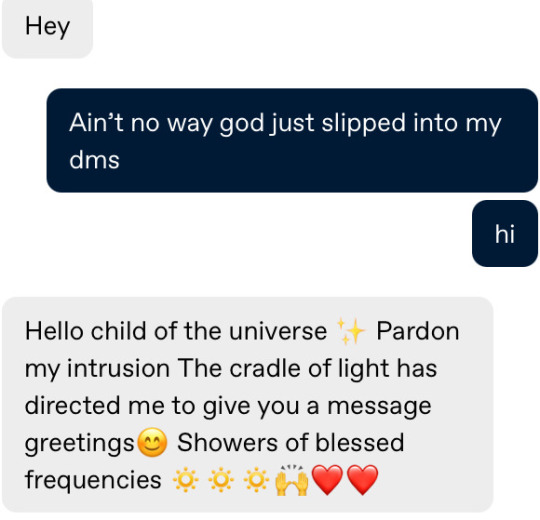
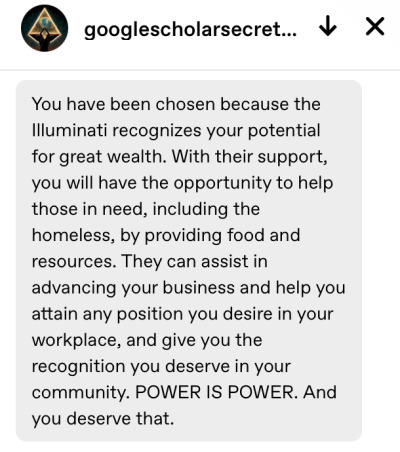
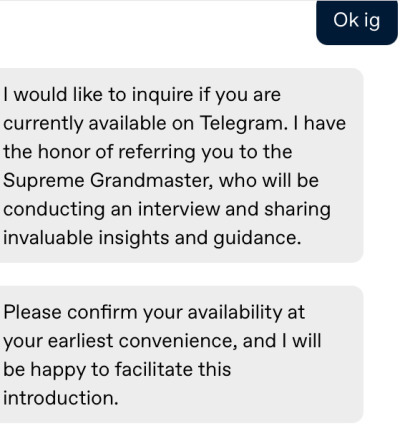
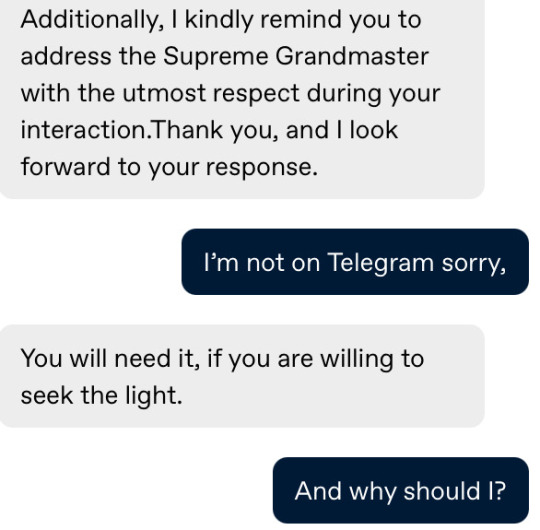
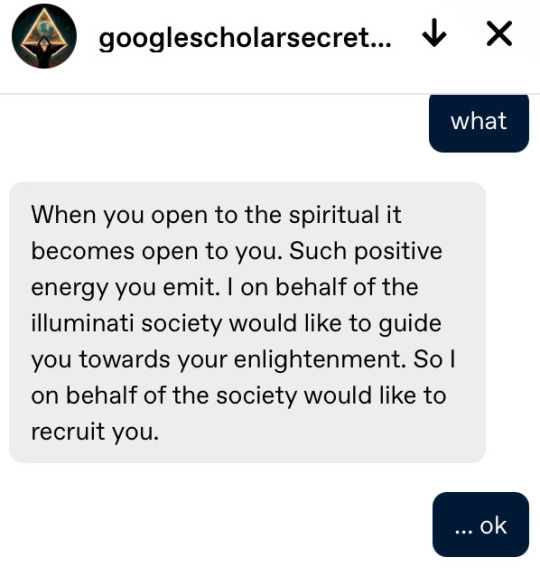
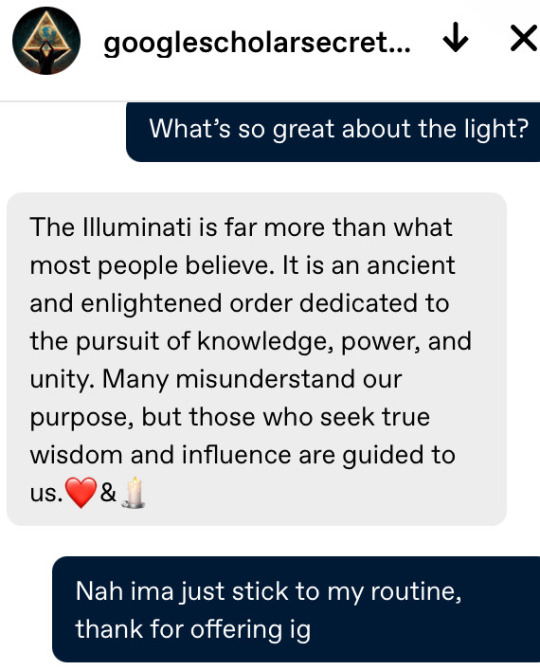
Here is anonymous's contact with mysticmason:
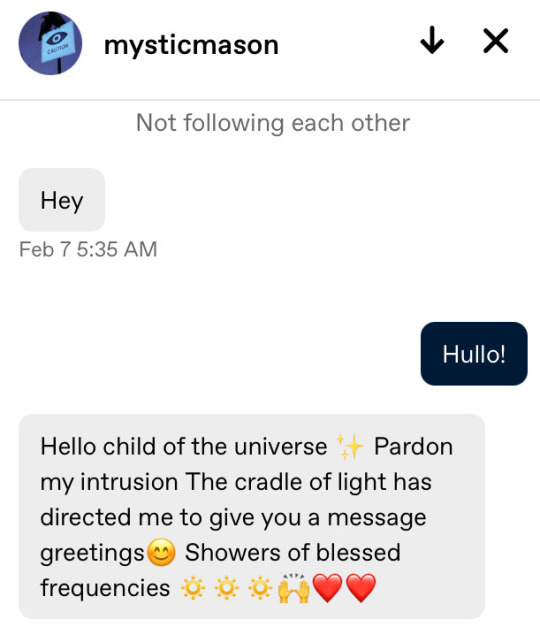
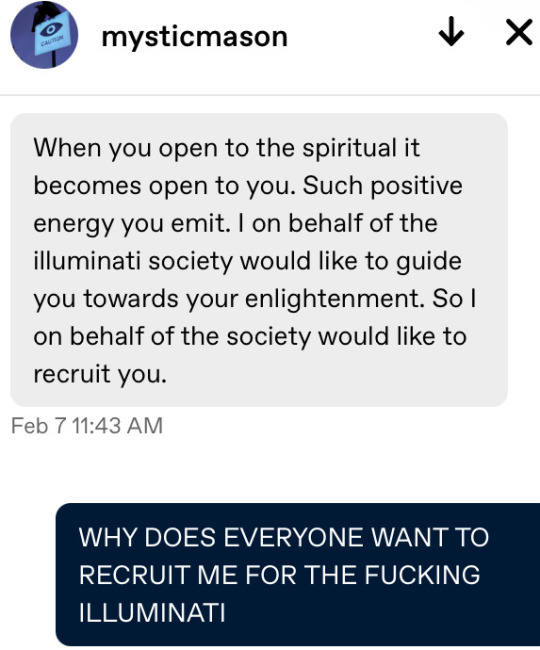
🚩Notable red flags🚩
Their blogs are full of generic AI generated images, philosophical scripture/nonsense, links to Illuminati websites/content that seem suspicious.
The offer of the impossible.
Wealth (of an undisclosed amount) to help the homeless with food and resources. Some 'means' of aiding your business and/or helping you attain any job position you desire in your work place. Some ✨magical✨ means of granting you recognition in your community. (As if they can suddenly make people change their opinions of you...)
Then instant request/demand that they need you to use Telegram for communication.
Telegram is a service that a lot of scammers use, and they use it because they can easily communicate with other scammers (and victims) there, and run their scams through it without it usually being able to be used as evidence should something like Identity Theft occur.
2 - How this scam works.
This scam works by... well, what I find to be the most obvious tactic that a lot of scammers use:
The life changing offer of a lot money... You just need to do a little something in return... ;)
From here I will be pulling information from this article from Bitdefender, one of the most well known and well trusted Antivirus brands on the market today. (That I use in fact! :D)
In regards to the emails- the original method this scam was spread:
The spam emails were traced to IP addresses in Nigeria (40%), South Africa (16%), the US (14%), the Netherlands (13%), and Argentina and Brazil (with 5% each).
Here are a list of benefits the Illuminati claims they can offer you if you join, taken from the Bitdefender article as well:
A new house bought in any country of your choice.
A monthly salary of $200,000
A blessing for joining which includes 10 million dollars.
A "magic talisman" that can cure any kind of illness or infection.
The power to prosper and improve.
Free access to Bohemians grove.
First class/VIP treatment at any airport in the world.
One-year appointment approval with the top 10 world leaders.
Appointments with world celebrities of your choice.
A personal car with your name customized on it.
The seven-book of Moses to learn the language of ORIS for "powers".
And a lot more!...
You just have to buy the required items for you to become an initiate member into the 'brotherhood.'
Which is when they'll have you fill out a sheet with all of your personal information, work occupation, wage earnings, as well as request a photograph of you and/or your license for 'verification'.
If you do, they will steal your identity, use it to register for things like loans, ruin your credit, and your life is practically ruined. :(
Final Thoughts:
As I mentioned prior, you should never send this kind of information to anyone on the internet for any kind of reason if you do not know who you are speaking to on the other end, aka they're a stranger.
All these kinds of scams go off of are words, as that's all they are.
A promise made of just words.
No different than the free money or sugar baby/daddy scam where they promise you $3000 a month, all you have to do is 'send me $100+ to verify you want to do this.'
I know how life changing a lot of money can be, but do try to be logical and think about these things, for your sake and others!
Take care everyone.
#scam#scams#scam alert#scammer#scam awareness#scammers#scam warning#online scams#psa#internet safety#public service announcement#illuminati scam#templeoflight66#symbolsand-shadow#mysticmason#googlescholarsecretsandsybmols#illuminatiinsights#illuminati#conspiracy#thehiddenodex
26 notes
·
View notes
Text
One of the more pointlessly frustrating things that ever happened to me was getting an email that told me I was switching cell phone carriers. The email just said "Notice: Your Verizon Wireless service is transitioning to AT&T". This was back in 2010, when that was a slightly bigger deal, since LTE wasn't widely available in the United States at the time. Verizon was using one standard, AT&T was using the other, and most phones could not switch between the two because they required fundamentally different hardware.
The email said that they were going to get me a new phone, and that my Verizon plan would become an AT&T plan in some kind of bastardized version of grandfathering, without changing the rate I was paying.
It did not explain to me why this was happening, or how, and I didn't find out until later, in spite of a few emails inquiring what the fuck they thought they were doing.
This was the biggest pain in the ass I have ever experienced. I was one of a group of people this was happening to, but it was a small group of mostly rural customers, and between the time I'd signed up with Verizon and when the switch happened, I had moved away from where virtually all the other customers were. I had no way of knowing this at the time, but it meant that when I went to the AT&T store, they had not had any training whatsoever in what was supposed to happen. They didn't believe me until I showed them the documentation, and even then, I think they were a little skeptical. Managers were called.
Eventually I got it sorted out, but it was even more complicated than it needed to be because my dad had been the one to sign me up for the phone (I was in college at the time) and his name was the one on the account. He lived four hours away from me, and AT&T did not seem to know what to do about this whole thing.
But I did, eventually, learn how and why I was being made to switch carriers.
What had happened is that back in 2008, two years prior, Verizon announced that it was set to acquire Alltel. This would have created a monopoly (Alltel and Verizon were significant competitors), so the FCC required that part of Alltel would be spun off into its own company that would remain independent in order to ensure that there was market competition, particularly in rural areas. AT&T then snapped up some of the remaining pieces of Alltel. In theory this should not have affected me, because I was a Verizon customer, not an Alltel or AT&T customer.
So what happened to me was more complicated.
As background, the FCC divides cell phone markets into Cellular Market Areas (CMAs), which are then either Metropolitan Statistical Areas (MSAs) or Rural Service Areas (RSAs). There are about 750 total CMAs in the United States.
Back in 2005, Alltel acquired Midwest Wireless Holdings. There was a consent decree in 2006 that required them to divest markets that would have been anticompetitive, and four of those RSAs were then snatched up by Rural Cellular Corporation. Rural Cellular was then bought by Verizon in 2009.
So there was one single RSA, out of 750 in the United States, which was covered by the Alltel/Midwest consent decree and the Alltel/Verizon consent decree, and for all this merger madness to go ahead, it was agreed that Verizon could acquire everything in that RSA conditional on "prompt redivestiture" to a buyer approved by the DOJ. Most of these customers would go from being Alltel customers to being customers of someone else, not Verizon, but Verizon did also have to give up some of their own original customers.
Here is the punchline: the Department of Justice, in order to promote competition in the free market, forced me to change carriers to someone I did not choose for myself. Like if I was about to go to Burger King and they forced me to go to McDonald's instead so that there would be "fair competition". Absolutely ludicrous, at least from my perspective.
Anyway, this was all back in 2010, so ... thanks, Obama.
32 notes
·
View notes
Text

274 Palestinian lives don’t matter to the Biden administration
This week provided further evidence – if any were lacking — that anti-Palestinian bias is simply a rule of American politics, and today maybe the leading rule.
Yesterday Israel killed 274 Palestinians and wounded hundreds more in Gaza’s Nuseirat refugee camp while freeing four Israeli hostages, and the U.S. promptly hailed the “rescue”. It is beyond question that this was an indiscriminate massacre, but Joe Biden saluted the Israeli action, and so did Secretary of State, without a mention of Palestinian lives.
“As if we needed more proof of how little this administration values Palestinian lives,” Khaled Elgindy wrote.
Mainstream reporters are horrified, but politely. After the last outrage earlier this week, when Israel killed dozens of Palestinians in a school, a reporter asked at the State Department: “People might find it very puzzling that you have the leverage of $3.8 billion of defense supplied to the Israelis per year, and you cannot compel this situation to change.”
The State Department said the U.S. has prodded Israel, and there’s been progress. “We have seen them [the Israelis] take improvements over time.”
So the U.S. keeps pouring money and weapons into Israel, and the Democratic base believes overwhelmingly that it’s a genocide, and Biden keeps saying he wants a ceasefire, but won’t apply any pressure to achieve it.
Republicans are at least more honest about their policy. Nikki Haley—a possible running mate for Trump —visited Israel at the end of May and wrote “Finish them” on an Israeli shell. Even as the death count in Gaza crossed 36,000.
This disdain for Palestinian life is consistent throughout the American establishment. Variety reported this week that a Hollywood marketing guru warned her employees that they should hit “pause on working with any celebrity or influencer or tastemaker posting against Israel.”
In an email, Ashlee Margolis said, “Anyone saying Israel is committing a ‘genocide’ is someone we will pause on working with, as that is simply not true…. While Jews are devastated by the loss of innocent lives in Gaza, we are feeling immense fear over the rising Jew Hatred all over the world.”
So again, Palestinian lives just don’t matter, next to Jewish fears.
This special degraded status for Palestinians has become an area of study for Palestinian intellectuals. Rabea Eghbariah, a human rights lawyer and doctoral student at Harvard, wrote a lengthy legal argument for a new term for the Palestinian condition.
“The law does not possess the language that we desperately need to accurately capture the totality of the Palestinian condition. From occupation to apartheid and genocide, the most commonly applied legal concepts rely on abstraction and analogy to reveal particular facets of subordination,” Eghbariah wrote –and offered the idea of “Nakba” as a legal concept to encompass that subordination.
But Eghbariah’s argument was censored, first by the Harvard Law Review, in “an unprecedented” move against a fully-edited essay, as the Intercept reported. Then, in an even more unprecedented fashion, by the Columbia Law Review this week, whose board of directors, which includes alumni with ties to the Biden administration, actually shut down the entire website when Eghbariah’s piece went up. (In the ensuing controversy, they have now restored the site).
In the eyes of the world, Palestinians only count when they are dying. That is what Qassam Muaddi wrote at our site this week, in an essay titled, “Against a world without Palestinians.”
Over the years, learning our Palestinian history, I began to notice that in order to be acknowledged by the rest of the world, we Palestinians always had to die…. It is as if in order to exist without justification, Palestinians had to intimately deal with death — they could master it, put up the best show of it, but they always had to die.
Qassam went on to explain that all that builds Palestinian character, including culture and stories, has no place in the world as it is. It must always be dismissed as terrorism or something less than human.
He actually ends that essay with hope, that the global discourse of Palestine is finally changing.
And the next day, another 274 Palestinians were killed, with full U.S. support. And Democrats wonder why democracy is in crisis.
#free gaza#gaza#gaza strip#israel is a terrorist state#genocide#jerusalem#gazaunderattack#israel#palestine#free palestine#news#palestine news#jabalia#support palestine#gaza genocide#rafah#save rafah#open rafah crossing#all eyes on rafah#free rafah#rafah under attack#tel aviv#yemen#current events#idf#idf terrorists#fuck the idf#hostages#palestinians#hamas
57 notes
·
View notes
Note
any tips for getting into copywriting?
Learn the basics of copywriting & writing fundamentals/ marketing skills
Study the different types of copywriting (web/banners, email, social, ads, direct mail, sales letters, etc.)
Decide on your niche(s). Study everything you can about the industry, trends, latest news, customer demographics/psychographics, customer behavior, types of lifestyles/preferences they have, how they speak, where they spend the most time (IRL or digitally)
Craft an inspiration folder full of compelling copywriting examples you find when browsing on the web, going through your email, scrolling on social media, billboards, magazines, direct mail, etc.
Practice rewriting these examples with your own flair. Evaluate it, and keep practicing until you're proud of your copy.
Be as concise, clever, and convincing as possible. Keep your tone conversational (write like how you would speak), catchy, simple, and witty. Take out any extraneous or fluff words. Pepper in cultural references, puns, and relatable anecdotes understood by your target audience when relevant to your messaging/CTA
Create a portfolio with these mock-ups or projects done for family/friends (state they're spec work, not client-commissioned samples) or clips from an internship, school work, etc.
Craft a USP for yourself (including your niche, copywriting specialties, and the specific expertise you offer within your broader niche/service offerings that makes you unique)
Create an Upwork profile and share your services on LinkedIn (optimize both of these profiles)
Research local clients and small businesses within your niche. Also, take time to create a list of dream clients. Study their copy, brand voice, and keep tabs on updates regarding these companies' happenings
Learn the art of a cold email/LinkedIn pitch/Upwork proposal. Introduce yourself and your services to your prospect and share with them how you can fulfill a specific need they're seeking out (For local and smaller companies, feel free to offer suggestions. With more established companies, connect the dots as to why your experience/expertise is a great fit for their brand/target audience), and attach your work/link to your LinkedIn profile, website, and any other relevant hub for your professional services & content
Ask for referrals from friends/family to get started. If they're not a relative, get a testimonial to include in your portfolio
Follow up once if you haven't heard back from a prospective client after an initial pitch after a few days
Search for potential gigs on sites like Upwork/ProBlogger/People Per Hour
Once you land a gig, execute to the best of your ability and hand in your work by the deadline (strategies surrounding best business practices is a whole other post, lol)
Gather testimonials from all clients of successful projects. Confirm with clients whether you can use their work in your portfolio if you're unsure
Continue studying copywriting from books, courses, and everyday reading & living
Stay knowledgeable about advancements/updates in your field, keep updated on current events, and culture/social trends, and read a lot in general. Have interesting, multi-faceted conversations with others. Observe what makes people tick & remain engaged in a verbal dialogue or content
#copywriting#creative writing#women writers#writers on tumblr#writeblr#copy writing#female entrepreneurs#successhabits#skill building#writing skills#marketing tips#business tips#women business#glow up tips#level up journey#entreprenuership#success habits#study tips#creative process#creative practice#communication skills#career options#career advice#professionalism#networking#femmefatalevibe
194 notes
·
View notes
Text
By Francesca Block
A prominent trade publication refused to advertise a new book because it feared the word Israel in its title might upset its audience, The Free Press has learned.
This month Melanie Notkin, an author and communications consultant, tried to place an advertisement for Bernard-Henri Lévy’s new book, Israel Alone, in Shelf Awareness, a trade publication for publishing professionals including booksellers and librarians. The book, published in the U.S. last month by Post Hill Press imprint Wicked Son, is about Lévy’s experiences in Israel post–October 7, 2023.
On October 9, a representative from Shelf Awareness told Notkin her ad was approved for the price of $2,300, and would run on November 1 in its weekly newsletter, which is sent to more than 600,000 readers.
But two days later, Matt Baldacci, the publisher for Shelf Awareness, emailed Notkin to tell her the magazine was “canceling” it. When Notkin asked why, Baldacci agreed to speak to her over the phone that same day.
Listen to Baldacci and Notkin’s conversation on the call here:
In audio of that phone call exclusively obtained by The Free Press, Baldacci told Notkin the ad was rejected because the book would cause too much controversy. “Why did we cancel the ad?” Baldacci said to Notkin. “We have a responsibility to our 250 independent bookstore partners, and it’s our feeling that running that ad in their publications, for some of those partners, is going to cause them trouble that they haven’t asked for and don’t wish to have.”
“For certain stores, an ad for Israel Alone will cause the employees to go to the management and say, ‘We don’t support this. Why are you doing this?’ Now we can debate, you know, whether they’re right or they’re wrong, but the point is, it will happen.”
He went on to note that “customers will complain,” too. “We can debate about the rightness or the wrongness of those customers complaining, but the fact is that they will, and our partners trust us to protect them from those kinds of situations. So we had to make the difficult decision not to accept the ad.” Baldacci did not reply to several requests via phone and email for comment from The Free Press.
Notkin told The Free Press she “was in shock” after the phone call. “And I thought to myself, you know, they don’t fire employees for antisemitism. Instead, they cancel the ad with Israel in the title. If the book were titled Black Alone, Gay Alone, Palestinian Alone, I��m hedging this wouldn’t have been a problem.”
“If the word Israel is too hot a potato to have on the pages of your newsletter as a paid ad, when does it become the word Jew?” she continued. “When does it become a Jewish author? When does it become anything to do with anybody Jewish in America? When students say ‘We don’t want Zionists on our campus,’ when a publication says ‘We don’t want an ad that says Israel on its title in our publication,’ what does this say about the direction we’re headed in America?”(via Post Hill Press)
Martin Peretz, the former publisher and editor of The New Republic, who had intended to pay for the ad and hired Notkin to place it, said it was “a scandal and a travesty that anyone in the book trade should reject” it. Peretz said he had wanted to support the work of his friend Lévy, who is “one of the most distinguished and accomplished intellectuals in the West.” Lévy, 75, is the author of more than 45 books, including the 2006 New York Times bestseller American Vertigo: Traveling America in the Footsteps of Tocqueville.
Founded in June 2005, Shelf Awareness provides “essential information” to “a range of people in the industry—booksellers, librarians, book buyers at nontraditional stores, members of the media, marketers, salespeople, publishers, and others,” according to its website. The outlet produces two free newsletters: a daily news blast for 37,000 publishing professionals, and a weekly list of new and recommended titles aimed at 645,000 general readers. The publication influences which books get the most attention and marketing at the country’s most important bookstores. Shelf Awareness boasts on its website that “the buyers at B&N”—meaning Barnes & Noble—“and Amazon read us daily.”
The rejection of an ad for a pro-Israel book is the latest instance in a worrying trend of erasing Jewish writers and thinkers from intellectual spaces. Last month, the New York State Writers Institute canceled a literary panel at the University of Albany because other authors refused to share the stage with a “Zionist” moderator. In August, a Brooklyn bookstore canceled a Jewish author’s book event because the rabbi he was scheduled to speak with was a “Zionist.”
Yossi Klein Halevi, a senior fellow at the Shalom Hartman Institute and an Israeli American author of several books on Israel, including the New York Times bestseller Letters to My Palestinian Neighbor, told me the cancellation of Lévy’s ad is yet another example of a “totalitarian form of censorship.”
“There is an atmosphere of intimidation which is self-perpetuating because someone fears that intimidation will be applied. Then that opens the way to self-intimidation, and we know from totalitarian societies that the most powerful form of censorship is self-censorship,” Halevi said.
Of Jews in Western society today, he added: “We’re being pushed back in the ghetto.”
#shelf awareness#israel alone#bernard henri levy#yossi klein halevi#matt baldacci#antisemitism#cowardice
27 notes
·
View notes
Text

🌟 Enter the TAGS Fest fundraising raffle!
This Saturday, Dec 7th 2024, TAGS Fest is taking place at Fruitmarket, Edinburgh! If you'd like to support future TAGS events, you can buy a raffle ticket and enter to win one of two signed books from Edinburgh-based creator Hari Conner @haridraws! You can find a link to buy raffle tickets right here or buy tickets on the day at the TAGS welcome desk, right next to the entrance to the Warehouse.
Rules & more info about the books below the cut:
🏛️ INTO THE TOWER (14+) is a choose-your-own pathbook, out now internationally & online! - Illustrated solo RPG - Suitable for beginners, all you need is a pencil - Good gift for your nerdy partner, friend or DM - (By the same author: INTO THE DUNGEON (10+) for shorter, kid-friendly fun!)
💕 I SHALL NEVER FALL IN LOVE (14+) is a new graphic novel that just came out! - Jane Austen mashup x real marginalised history - ‘What if Mr Darcy was trans’ energy - Waterstones and bookshop.org ‘Best YA of 2024’ list
✏️ These books are by local author/illustrator HARI CONNER who extremely wishes they could attend TAGS Fest, but can't due to disability + immune problems. Their spirit is haunting the con and their books are here as tribute/prizes, though.
📄 RULES: One ticket = one entry. There is no limit on entries per customer. Two winners will be drawn to win one of each book. The winners will be contacted by email after TAGS Fest 2024. If a winner does not respond within one week of being contacted, another winner will be chosen. Prizes will be posted to the winners. UK addresses only, not open internationally.
———
TAGS Fest is a free-to-attend market event in Edinburgh dedicated to spotlighting Scotland’s small press talent, from comics and graphic novels to tabletop games and board games.
WHEN: December 7th 2024 WHERE: Fruitmarket, Edinburgh WHAT: A marketplace with over 40 independent creators, and a Board Game Zone with both drop-in and bookable games available!
🏷️ Learn more about TAGS Fest and our other exhibitors at tagsfest.co.uk
9 notes
·
View notes
Text
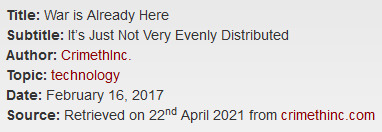
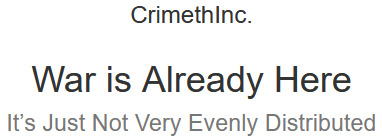
Author: CrimethInc. Topic: technology
“The future is already here,” Cyberpunk pioneer William Gibson once said; “it’s just not very evenly distributed.” Over the intervening decades, many people have repurposed that quote to suit their needs. Today, in that tradition, we might refine it thus: War is already here—it’s just not very evenly distributed.
Never again will the battlefield be just state versus state; it hasn’t been for some time. Nor are we seeing simple conflicts that pit a state versus a unitary insurgent that aspires to statehood. Today’s wars feature belligerents of all shapes and sizes: states (allied and non-allied), religious zealots (with or without a state), local and expatriate insurgents, loyalists to former or failing or neighboring regimes, individuals with a political mission or personal agenda, and agents of chaos who benefit from the instability of war itself. Anyone or any group of any size can go to war.
The increased accessibility of the technology of disruption and war[1] means the barrier to entry is getting lower all the time. The structure of future wars will sometimes feel familiar, as men with guns murder children and bombs level entire neighborhoods—but it will take new forms, too. Combatants will manipulate markets and devalue currencies. Websites will be subject to DDoS attacks and disabling—both by adversaries and by ruling governments. Infrastructure and services like hospitals, banks, transit systems, and HVAC systems will all be vulnerable to attacks and interruptions.
In this chaotic world, in which new and increasing threats ceaselessly menace our freedom, technology has become an essential battlefield. Here at the CrimethInc. technology desk, we will intervene in the discourse and distribution of technological know-how in hopes of enabling readers like you to defend and expand your autonomy. Let’s take a glance at the terrain.
Privacy
The NSA listens to, reads, and records everything that happens on the internet.
Amazon, Google, and Apple are always listening[2] and sending some amount[3] of what they hear back to their corporate data centers[4]. Cops want that data. Uber, Lyft, Waze, Tesla, Apple, Google, and Facebook know your whereabouts and your movements all of the time. Employees spy on users.
Police[5] want access to the contents of your phone, computer, and social media accounts—whether you’re a suspected criminal, a dissident on a watch list, or an ex-wife.
The business model of most tech companies is surveillance capitalism. Companies learn everything possible about you when you use their free app or website, then sell your data to governments, police, and advertisers. There’s even a company named Palantir, after the crystal ball in The Lord of the Rings that the wizard Saruman used to gaze upon Mordor—through which Mordor gazed into Saruman and corrupted him.[6] Nietzsche’s famous quote, “When you look long into an abyss, the abyss also looks into you,” now sounds like a double transcription error: surely he didn’t mean abyss, but app.
Security
Self-replicating malware spreads across Internet of Things (IoT) devices like “smart” light bulbs and nanny cams, conscripting them into massive botnets. The people who remotely control the malware then use these light bulbs and security cameras to launch debilitating DDoS[7] attacks against DNS providers, reporters, and entire countries.
Hackers use ransomware to hold colleges, hospitals, and transit systems hostage. Everything leaks, from nude photos on celebrities’ phones to the emails of US political parties.
Capital
Eight billionaires combined own as much wealth as the poorest 50% of the world’s population. Four of those eight billionaires are tech company founders.[8] Recently, the President of the United States gathered a group of executives to increase collaboration between the tech industry and the government.[9]
The tech industry in general, and the Silicon Valley in particular, has a disproportionately large cultural influence. The tech industry is fundamentally tied to liberalism and therefore to capitalism. Even the most left-leaning technologists aren’t interested in addressing the drawbacks of the social order that has concentrated so much power in their hands.[10]
War
Nation states are already engaging in cyber warfare. Someone somewhere[11] has been learning how to take down the internet.
Tech companies are best positioned to create a registry of Muslims and other targeted groups. Even if George W. Bush and Barack Obama hadn’t already created such lists and deported millions of people, if Donald Trump (or any president) wanted to create a registry for roundups and deportations, all he’d have to do is go to Facebook. Facebook knows everything about you.
The Obama administration built the largest surveillance infrastructure ever—Donald Trump’s administration just inherited it. Liberal democracies and fascist autocracies share the same love affair with surveillance. As liberalism collapses, the rise of autocracy coincides with the greatest technical capacity for spying in history, with the least cost or effort. It’s a perfect storm.
This brief overview doesn’t even mention artificial intelligence (AI), machine learning, virtual reality (VR), augmented reality (AR), robots, the venture capital system, or tech billionaires who think they can live forever with transfusions of the blood of young people.
Here at the tech desk, we’ll examine technology and its effects from an anarchist perspective. We’ll publish accessible guides and overviews on topics like encryption, operational security, and how to strengthen your defenses for everyday life and street battles. We’ll zoom out to explore the relation between technology, the state, and capitalism—and a whole lot more. Stay tuned.
Footnotes
[1] A surplus of AK-47s. Tanks left behind by U.S. military. Malware infected networked computer transformed into DDoS botnets. Off the shelf ready to execute scripts to attack servers.
[2] Amazon Echo / Alexa. Google with Google Home. Apple with Siri. Hey Siri, start playing music.
[3] What, how much, stored for how long, and accessible by whom are all unknown to the people using those services.
[4] Unless you are a very large company, “data center” means someone else’s computer sitting in someone else’s building.
[5] Local beat cops and police chiefs, TSA, Border Patrol, FBI… all the fuckers.
[6] Expect to read more about Palantir and others in a forthcoming article about surveillance capitalism.
[7] Distributed Denial of Service. More on this in a later article, as well.
[8] Bill Gates, Jeff Bezos, Mark Zuckerberg, Larry Ellison. In fact, if you count Michael Bloomberg as a technology company, that makes five.
[9] In attendance: Eric Trump. Brad Smith, Microsoft president and chief legal officer. Jeff Bezos, Amazon founder and CEO. Larry Page, Google founder and Alphabet CEO. Sheryl Sandberg, Facebook COO. Mike Pence. Donald Trump. Peter Thiel, venture capitalist. Tim Cook, Apple CEO. Safra Catz, Oracle CEO. Elon Musk, Tesla CEO. Gary Cohn, Goldman Sachs president and Trump’s chief economic adviser. Wilbur Ross, Trump’s commerce secretary pick. Stephen Miller, senior policy adviser. Satya Nadella, Microsoft CEO. Ginni Rometty, IBM CEO. Chuck Robbins, Cisco CEO. Jared Kushner, investor and Trump’s son-in-law. Reince Priebus, chairman of the Republican National Committee and White House chief of staff. Steve Bannon, chief strategist to Trump. Eric Schmidt, Alphabet president. Alex Karp, Palantir CEO. Brian Krzanich, Intel CEO.
[10] We’ll explore this more in a later article about “The California Ideology.”
[11] Probably a state-level actor such as Russia or China.
#technology#Privacy#Security#Capital#War#anarchism#anarchy#anarchist society#practical anarchy#practical anarchism#resistance#autonomy#revolution#communism#anti capitalist#anti capitalism#late stage capitalism#daily posts#libraries#leftism#social issues#anarchy works#anarchist library#survival#freedom
7 notes
·
View notes
Text
10 effective ways freelancers can land their first clients
Leverage Your Network: Start by reaching out to friends, family, and acquaintances. They may know someone in need of your services or might require them themselves.
Online Freelance Platforms: Sign up on freelance websites like Upwork, Freelancer, Fiverr, and Guru to create a professional profile and start bidding on relevant jobs.
Create a Portfolio: Build a strong online portfolio showcasing your best work. This gives potential clients a glimpse of your skills and expertise.
Utilize Social Media: Promote your freelance services on social media platforms like LinkedIn, Twitter, and Instagram. Join groups and forums related to your niche.
Cold Pitching: Research potential clients or companies in your field and send them personalized, well-crafted cold emails showcasing your value proposition.
Content Marketing: Start a blog or YouTube channel related to your expertise. Share valuable insights and tips, positioning yourself as an authority in your niche.
Attend Networking Events: Attend industry-specific events, conferences, and meetups to meet potential clients face-to-face and build relationships.
Join Freelancer Communities: Online communities like Reddit's r/freelance or specialized forums can be great places to learn, share experiences, and find job opportunities.
Offer Pro Bono Work: Initially, offer your services for free or at a reduced rate to gain testimonials and references to showcase your skills.
Collaborate: Partner with other freelancers or agencies who might have overflow work or need assistance on projects, creating mutually beneficial relationships.
Remember that building a client base takes time and persistence. Be patient, provide excellent service to your early clients, and continuously improve your skills and marketing efforts to attract more clients over time.
77 notes
·
View notes
Text

Daily Wildfire Updates: Jan. 29, 2025

Workers with the California Conservation Corps carry sandbags and compost filter socks as they work on various erosion, flood and debris control efforts to help mitigate flooding and debris flow ahead of forecasted rain following the Eaton Fire. Jan. 26, 2025. Photo by Jules Hotz for CalMatters
Tomorrow is our final edition of the Daily Wildfire Updates pop-up newsletter. We will restart this newsletter if emergency responses ramp up again. You’ll keep getting CalMatters’ coverage of California wildfires and other important issues in our daily or weekly newsletter.
Hey there, and welcome to the daily public media wildfires update.
It’s hard to know what comes next for Los Angeles, but we do know the cleanup phase is going to be a long one. In today’s newsletter, CalMatters explores what Texas’s experience can teach LA about rebuilding following a natural disaster, LAist looks at the lithium and other materials burned in the fires, and PBS NewsHour talks to the team behind the indispensable Watch Duty app.
Plus, Meryl Streep — yes, that Meryl Streep — cut a car-sized hole in her fence to escape the wildfires. Why are we not surprised?
Make sure to share your Love Letters to LA with KCRW — the station is collecting your favorite LA stories that celebrate community following the wildfire tragedies.
Stay safe.
The Latest
Glendale real estate agent charged in rent-gouging case. (LAist)
Trump’s conditions on aid put California Republicans in a tough spot. (CalMatters)
Meet the team behind the Watch Duty app. (PBS News Hour)
Looking Ahead
What California can learn from Texas on rebuilding after a natural disaster. (CalMatters)
Where are thehazardous materials from carsand other things burned in the fires going? (LAist)
Fact Check
How long could ash be a problem in LA? (LAist)
Resources & Ways to Help
EPA chief on hazardous waste removal. (Press Play/KCRW)
Wildfire cleanup panel playback: Health concerns, insurance, and more. (KCRW)
Volunteers are replacing beloved stuffed animals lost in the LA wildfires. (KCRW)
Moment of Zen/Mental Health
Share your ode to Los Angeles with KCRW for the upcoming ‘Love Letters to LA’ feature. (KCRW)
At the farmers market, chef Travis Hayden starts rebuilding by feeding others. (KCRW)
Great music for a great cause: Listen to and explore a running roundup of the benefit compilations released by and for LA’s music community impacted by the fires. (KCRW Music Relief)
Elsewhere on the Internet
Did a private equity fire truck roll-up worsen the LA fires? (BIG by Matt Stoller)
Meryl Streep, fire superhero. (People)
The Tom Waits song that got one fire victim through losing her home in 2017 to the Tubbs Fire. (USA TODAY)
This newsletter features free news and resources on the devastating wildfires in Los Angeles County. Did someone forward you this email?
Subscribe to Daily Wildfire Updates.
CalMatters, 1017 L Street #261, Sacramento, CA 95814, United States Instagram X LinkedIn App
5 notes
·
View notes
Text
Moon in Virgo: Tidy Up Your Biz and Harvest Financial Abundance
Astrologers, rejoice! Business gurus, unite! Because under the meticulous gaze of the Moon in Virgo, it's time to blend cosmic wisdom with practical strategy. Get ready for a potent mix of grounded energy, keen analysis, and a sprinkle of earthy magic ready to boost your business and finances.
Virgo's Virgo-ness: Picture a spotless spreadsheet, a perfectly balanced budget, and a to-do list so organized it whispers sweet satisfaction. That's Virgo's domain. When the Moon dances through this earth sign, it brings a laser focus on details, a knack for efficiency, and an urge to declutter both your physical and financial spaces.
Business Benefits:
Sharpened Skills: Hone your expertise, take that online course, or finally master that new software. Virgo's energy fuels learning and skill development, making you a powerhouse of knowledge and competence.
Channel your inner Hermione Granger under the Virgo Moon! Devour knowledge like polyjuice potion, mastering that new software with flick-of-the-wand ease. Whether it's an online course on astrological forecasting or the intricacies of blockchain technology, Virgo's studious energy makes you a sponge for information, transforming you into a confident, competence-wielding powerhouse ready to tackle any business challenge.
Streamlined Operations: Virgo loves a well-oiled machine. Use this lunar phase to audit your business processes, identify bottlenecks, and implement systems that save time and resources.
Don your efficiency hat, because under the meticulous Virgo Moon, streamlining your business becomes a cosmically ordained quest. Scrutinize processes like a celestial accountant, unearthing time-sucking bottlenecks and banishing them with automated spells (aka, handy new systems). Watch as email chains unfurl into streamlined communication channels, meetings morph into laser-focused action sessions, and your once-chaotic workflow hums like a perfectly tuned engine, freeing up precious time and resources for your entrepreneurial magic to truly shine.
Networking with Purpose: Quality over quantity is Virgo's motto. Connect with potential clients or collaborators who share your values and expertise. Think strategic partnerships, not random coffee chats.
Forget the business card bingo of generic gatherings – Virgo's discerning Moon demands quality connections. Seek out collaborators and clients who mirror your values and expertise, like kindred spirits drawn together by constellations of shared passion. Think chess match, not cocktail party. Craft targeted pitches that resonate with their specific needs, and cultivate strategic partnerships that feel like cosmically ordained alliances. This intentional networking isn't about collecting contacts, it's about igniting mutually beneficial collaborations that propel your business towards the stars.
Marketing Magic: Craft targeted campaigns that speak directly to your ideal customer's needs. Virgo's analytical prowess helps you understand your audience and deliver messaging that resonates.
Under the analytical gaze of the Virgo Moon, ditch the shotgun marketing blasts and unleash laser-focused campaigns that whisper sweet nothings to your ideal customer's soul. Virgo's eagle eye pinpoints their deepest desires and pain points, transforming you into a messaging maestro. Craft content that speaks their language, addresses their specific struggles, and showcases your solutions like the missing puzzle piece to their perfect life. Let go of generic pitches and embrace storytelling that resonates with their values, because under this lunar influence, targeted marketing isn't just effective, it's downright magical.
Financial Fortunes:
Budgeting Bliss: Break out the spreadsheets and get granular. Categorize expenses, track income, and create a budget that feels secure and sustainable. Virgo loves a balanced bottom line.
Spreadsheets sing and budgets balance under the Virgo Moon! Unleash your inner accounting alchemist and transform financial chaos into crystal-clear clarity. Categorize expenses with the precision of a cosmic librarian, track every penny like a moonbeam, and craft a budget that feels not like a restrictive cage, but a beautifully organized, secure haven for your financial future. Virgo craves equilibrium, so find that sweet spot where income and outgoings waltz in perfect harmony, leaving you feeling abundant and empowered, the maestro of your own financial orchestra.
Debt Disposal: Tackle outstanding debts with renewed determination. Negotiate better terms, make extra payments, and experience the liberation of financial freedom.
Ditch the debt demon and embrace the warrior spirit under the Virgo Moon! Channel your inner debt disposal dragon, breathing fire upon outstanding balances with renewed determination. Hone your negotiation skills like a celestial diplomat, securing lower interest rates and crafting repayment plans that fit your budget like a cosmic glove. Make extra payments with the fervor of a moonbeam illuminating a dark cave, watching those numbers shrink faster than a vampire in sunlight. Embrace the sweet liberation of financial freedom, feeling the weight of debt lift like a cosmic spell dissolving, leaving you empowered and ready to conquer your financial Everest.
Savvy Investments: Research, compare, analyze – Virgo's energy is perfect for making informed investment decisions. Seek advice from trusted professionals and prioritize long-term stability over short-term gains.
Transform into a celestial stockbroker under the Virgo Moon! Put on your research goggles and analyze potential investments like a cosmic detective, comparing, contrasting, and sniffing out hidden risks. Consult trusted financial oracles for guidance, but ultimately, let your own Virgo-honed discernment be your compass. Prioritize long-term stability over fleeting trends, building a portfolio that grows like a well-tended celestial garden, not a gambler's dice roll. Embrace the slow and steady path, for under Virgo's meticulous gaze, informed investments blossom into financial freedom, one calculated decision at a time.
Unexpected Windfalls: Keep an eye out for unexpected opportunities to increase your income. Virgo favors those who put in the work, so your dedication could be rewarded with a bonus, a new client, or a lucky windfall.
Keep your antennae tuned to cosmic whispers under the Virgo Moon, for fortune often favors the prepared! Your dedication and sharpened skills could attract unexpected boons like a bonus shimmering out of thin air, a new client drawn by your newfound expertise, or a windfall landing softly as a celestial feather in your lap. Remember, Virgo rewards hard work, so keep hustling, honing, and learning, and trust that the universe may just surprise you with a bonus chapter in your financial story.
Bonus Tip: Embrace the earthy magic of Virgo! Surround yourself with green spaces, incorporate crystals like citrine and jade into your workspace, and practice grounding exercises to channel the Moon's practical energy.
So, there you have it! The Moon in Virgo is your invitation to tidy up your biz, fine-tune your finances, and reap the rewards of your focused efforts. Remember, success is a marathon, not a sprint. Pace yourself, celebrate the small wins, and trust that under Virgo's meticulous guidance, your business and finances will shine.
Now go forth and conquer, astrologically savvy entrepreneurs! Your financial stars are aligned.
#Moon in Virgo#Virgo Moon#business astrology#Astrology business#finance astrology#astrology updates#astro#astrology facts#astro notes#astrology#astro girlies#astro posts#astrology community#astrology observations#astropost#astro observations#astro community
48 notes
·
View notes
Text
DeepSeek Dollars: 5 Expert Tips to Profit from the Sensational AI App Wave

Are you curious about AI software that can boost your online earnings? Deepseek Dollars might be the solution you need.
Deepseek Dollars is an AI tool. The goal? To help you make more money online. It uses smart algorithms. These algorithms find the best niches and opportunities for you. The result? More earnings with less effort.
Whether you're experienced or just starting out, this software can help. It promises to make things easier for you.
Here's my story. I tried Deepseek Dollars myself. At first, I was skeptical. But then, I saw the results. It really made a difference.
Key features include:
Finding profitable niches
Optimizing your income streams
Easy-to-use interface
The good news? You also get some great bonuses when you sign up.
Ready to learn more? Keep reading. Deepseek Dollars might just transform your online business. For more details, visit DeepSeek Dollars.
What You will Get with DeepSeek Dollars:
AI-Powered Content Creation – Generate high-quality articles, eBooks, and reports instantly.
Sell AI-Generated Digital Products – Make and sell printables, templates, and more.
Offer AI-Powered Services – Provide copywriting, email marketing, and ad content.
Build a Profitable Website – Monetize AI-generated content with ads and affiliate marketing.
Start an AI-Powered YouTube Channel – Generate scripts and monetize videos easily.
Launch an AI-Powered Online Course – Create and sell educational content.
Self-Publish AI-Generated Books – Write and sell books in any genre.
How To Start
Purchase DeepSeek Dollars – Get your copy of DeepSeek Dollars to access AI-powered tools.
Generate AI Content or Products – Use DeepSeek to create content, digital products, or services.
Monetize and Earn – Sell your creations, offer services, or use them for passive income.
Bonus Point of DeepSeek Dollars
Bonus 1: DeepSeek Dollars Mastery
Want to earn more without breaking a sweat? Learn how to use DeepSeek Dollars to boost your earnings. It's simpler than you think.
Bonus 2: AI Profits Blueprint
Ever thought about using AI to grow your online income? With this blueprint, you can automate tasks and watch your earnings grow. It's like having a robot working for you 24/7.
Bonus 3: Affiliate Fast Track
Jumpstart your affiliate marketing journey. Follow tried and tested strategies to see quick results. Think of it as a shortcut to success.
Bonus 4: Social Media Domination
Need more traffic? This guide shows you how to get unlimited free traffic from social media. Imagine turning your followers into customers without spending a dime.
Bonus 5: Ultimate Passive Income Guide
Dreaming of financial freedom? Learn how to create multiple streams of passive income. It's like planting seeds that keep growing money trees.
The good news? These bonuses are designed to help you succeed, no matter where you're starting from.
My Experience With Deepseek Dollars
Using DeepSeek has been quite the adventure. I began with small projects. You know, generating blog posts and digital products. Then, I took a leap into creating online courses and even AI-generated books. The best part? Automating content creation saved me a ton of time.
My website traffic went up. I started earning money from different sources. It felt great!
Thinking about trying DeepSeek? Here’s my advice:
Start small. Begin with simple projects.
Experiment. Try different methods to see what works best for you.
Remember, AI is a powerful tool. But the key to success? Consistency and creativity.
Who is DEEPSEEK DOLLARS For?
Are you wondering if DEEPSEEK DOLLARS is right for you? Let me break it down:
Affiliate Marketers: If you're promoting other people's products, this is for you.
Stay-at-Home Moms: Want to earn extra cash without leaving the house? This could be your ticket.
Ecommerce Store Owners: Need a boost in sales? DEEPSEEK DOLLARS might help.
Local Business Owners: Looking to expand your reach? This tool might be what you need.
Clickbank Affiliates: If Clickbank is your playground, you'll find value here.
CPA Marketers: Cost-per-action marketers, this is for you too.
Frequently Asked Questions
What Are Deepseek Dollars?
Deepseek Dollars are a digital currency designed for online transactions. They offer a secure and efficient way to make payments.
How Do Deepseek Dollars Work?
Deepseek Dollars work by utilizing blockchain technology. This ensures secure and transparent transactions for users.
What Are The Benefits Of Deepseek Dollars?
Benefits include fast transactions, low fees, and enhanced security. They are ideal for both personal and business use.
Are Deepseek Dollars Safe To Use?
Yes, Deepseek Dollars are safe. They use advanced encryption methods to protect user information and transactions.
Conclusion
DeepSeek Dollars offers unique features and great benefits. My experience with this AI software has been positive. It's user-friendly and delivers impressive results. If you need reliable AI software, consider DeepSeek Dollars. For more details, visit the DeepSeek Dollars page. This tool can simplify your tasks and improve efficiency. Try it today and see the difference.
#DeepSeek Dollars#passive income#high ticket profit#affiliate marketing#make money online#businessgrowth#ai app
4 notes
·
View notes